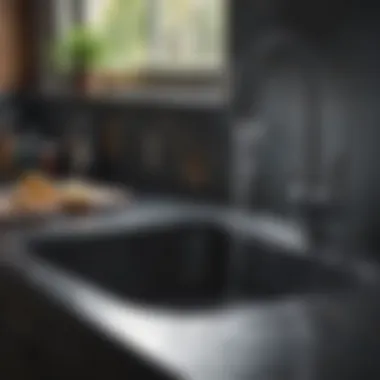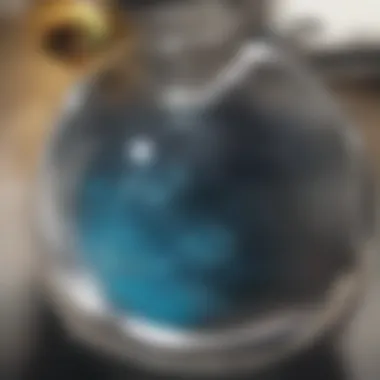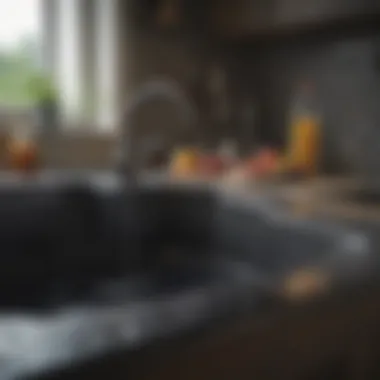Understanding Black Water Issues in Kitchen Sinks


Intro
Black water is an alarming issue that often surfaces in kitchen sinks. This phenomenon is not only undesirable but can pose significant health risks to household occupants. Understanding the underlying causes, implications, and possible solutions is crucial for homeowners. Awareness about black water can play a part in maintaining hygiene and safety in living spaces.
The appearance of black water is typically related to plumbing issues or poor maintenance. Recognizing the signs and knowing how to respond can prevent a minor problem from escalating into a more serious crisis. With the right knowledge, homeowners can tackle this issue effectively, ensuring a clean and healthy kitchen environment.
This article explores the causes of black water, its potential dangers, and effective mitigation strategies. We delve into household plumbing systems, maintenance practices, and provide actionable insights for homeowners. By equipping readers with this knowledge, the aim is to foster a safer and healthier home.
Causes of Black Water in Kitchen Sinks
Several factors can lead to the emergence of black water in kitchen sinks. Identifying these causes is the first step in addressing the problem:
- Clogged Drains: Oftentimes, a buildup of food particles, grease, or other debris can lead to a clogged drain, causing stagnant water that appears discolored.
- Backflow Issues: A malfunctioning plumbing system can cause backflow, where sewage or contaminated water flows back into drains, leading to black water.
- Faulty Pipes: Old or damaged pipes can allow contaminants to seep into the water supply.
Health Hazards Associated with Black Water
The presence of black water can pose several health hazards, including:
- Bacterial Growth: This water can harbor harmful bacteria, leading to potential infections or illnesses for those exposed.
- Chemical Contamination: If chemicals from cleaning products mix with the wastewater, they can become hazardous.
- Unpleasant Odors: Black water often emits foul smells, which can affect the quality of life at home.
"Neglecting to address black water issues promptly can lead to significant long-term implications for both health and home safety."
Mitigation Strategies
Preventing and addressing black water issues requires proactive measures. Here are some effective strategies:
- Regular Maintenance: Regularly clean sink drains to remove buildup and avoid clogs.
- Install a Backflow Preventer: This device helps prevent contaminated water from flowing back into the plumbing system.
- Inspect Plumbing Systems: Periodic inspections by professionals can identify issues with pipes before they become major problems.
Household Plumbing Systems
Understanding your home's plumbing system is beneficial in recognizing black water issues. Homeowners should be aware of:
- Main Sewer Lines: These carry waste away from the home. Any issues here can impact the entire plumbing system.
- Fixtures and Connections: Leaky connections can introduce contaminants into the system.
- Ventilation Systems: Proper ventilation helps maintain air quality and prevents odor build-up.
Ending
Recognizing and addressing black water issues in kitchen sinks is vital for maintaining a healthy home. By understanding the causes and potential hazards, homeowners can take preventive measures. Implementing regular maintenance practices and being aware of the plumbing system can help in mitigating these risks. Remember, a clean and functional kitchen is not just about aesthetics; it is essential for your family's health and safety.
Prologue to Black Water Issues
Black water issues in kitchen sinks represent a significant concern for homeowners. Understanding these issues can greatly enhance a household's health and hygiene. Black water is not merely an aesthetic problem; it can pose serious risks to both physical health and property integrity. For individuals who care about their living conditions, it is essential to understand the implications of black water.
Defining Black Water
Black water is sewage and wastewater that contains human waste. It is different from gray water, which is used water from sinks, showers, and laundry. The presence of black water suggests serious plumbing issues, as it indicates that sewage has backed up into living spaces. Households facing this issue must address it promptly to avoid worsening conditions.
Common Sources of Black Water in Homes
Several factors can lead to black water emerging from a kitchen sink. Common sources include:
- Clogged drains: Over time, food particles, grease, and other debris can accumulate, leading to blockages that cause wastewater to back up into the sink.
- Faulty plumbing: Poorly designed or deteriorated plumbing can allow sewage to flow back into the kitchen.
- Sewer line problems: When the main sewer line is obstructed or damaged, it can lead to the reversal of sewage flow, resulting in black water entering the home.
Homeowners who are aware of these sources can take proactive measures to prevent black water problems, thus ensuring a cleaner and healthier environment.
Understanding Kitchen Sink Plumbing


Understanding the plumbing system behind your kitchen sink is crucial when addressing issues related to black water. Kitchen sink plumbing encompasses a network of pipes and components that work together to efficiently manage water flow and waste disposal. By having a solid grasp on how this system functions, homeowners can identify potential problems early. This knowledge not only helps in troubleshooting issues but also plays a significant role in maintaining hygiene and preventing health risks associated with black water.
Basic Components of Kitchen Sink Plumbing
The basic components of kitchen sink plumbing include the sink basin, drain pipes, P-trap, venting system, and the supply lines. Each of these plays a specific role in the flow of water.
- Sink Basin: This is where the water collects and is the primary interface for use.
- Drain Pipes: These pipes lead wastewater away from the sink into the home's drainage system.
- P-trap: This U-shaped pipe prevents sewer gases from entering the home while allowing water to flow through.
- Venting System: Proper venting helps maintain air pressure in the plumbing system, facilitating smooth drainage.
- Supply Lines: These pipes carry fresh water from the main supply to the faucet.
Each component works in unison to create a functional kitchen sink system. Lack of understanding about how these elements connect can result in ignoring signs of potential failures, leading to black water issues.
How Black Water Can Back Up
Black water backflow can occur when there is a blockage or malfunction within the plumbing system. This can happen for various reasons:
- Clogs in the Drain Line: These are often caused by the accumulation of food particles, grease, and other debris.
- Malfunctioning P-Trap: If the P-trap becomes clogged or damaged, it could hinder the flow of water, leading waste to back up into the sink.
- Sewer Line Problems: Issues within the main sewer line can cause severe backflows of black water into household drains.
- Air Pressure Imbalance: An improper venting system can create negative pressure, trapping wastewater instead of allowing it to escape.
To prevent such occurrences, regular maintenance and inspections are essential. Homeowners can monitor for signs like slow draining and foul odors, which often indicate deeper plumbing issues.
Proper understanding of kitchen sink plumbing is essential to prevent and address black water issues, ensuring a hygienic home environment.
Identifying Causes of Black Water Emergence
Identifying the causes of black water emergence is vital for homeowners who seek to maintain a healthy and safe living environment. Black water originates from toilets, sinks, and drains when improper waste disposal occurs or when sewer systems break down. Understanding these causes allows homeowners to take preventive actions and mitigate health risks associated with black water exposure.
Clogged Drains and Their Role
Clogged drains are among the primary culprits of black water issues in kitchen sinks. When debris, grease, food particles, and soap scum accumulate in pipelines, they create blockages that prevent proper flow. This obstruction can lead to sewer backsplashes into the kitchen sink, causing foul odor and potential exposure to harmful pathogens.
Key Points on Clogged Drains:
- Accumulation of debris leads to blockages.
- Improper disposal of food can exacerbate the problem.
- Regular maintenance can help avoid clogs.
Sewer Line Issues
Another significant reason for black water problems is issues with the sewer line. The sewer line is responsible for transporting waste away from the home. Over time, these pipes may corrode, crack, or collapse due to age or ground movement. Such conditions can result in backflows or leaks, introducing black water into kitchen sinks.
Noteworthy Considerations:
- Tree roots may damage sewer lines, causing blockages.
- Regular inspections can detect sewer line issues before they escalate.
- Understanding local sewer codes and regulations can help in proper usage.
Faulty or Damaged Pipes
Faulty or damaged pipes in the plumbing system can contribute significantly to black water emergence. Wear and tear on pipes can lead to leaks, allowing sewage materials to seep into household water supplies. Additionally, older homes may have older plumbing systems with material deficiencies that increase the risk of black water contamination.
Important Details about Pipe Damage:
- Corrosion can cause pipes to weaken and break.
- Constant moisture can promote mold growth in such situations.
- Timely replacement of damaged pipes can avert long-term issues.
The identification of causes behind black water is essential; neglecting this can lead to health hazards and costly repairs.
Keeping a close eye on plumbing systems, drains, and waste disposal can significantly decrease these risks, ensuring a safe environment.
Health Risks Associated with Black Water
Understanding the health risks related to black water is crucial for every household. Black water contains a variety of harmful microorganisms and pathogens, posing significant health concerns. Awareness of these risks helps homeowners identify and respond effectively to issues before they escalate. This section will delve into specific health hazards stemming from black water, emphasizing the need for proper management and preventative measures.
Bacterial Contamination


Bacterial contamination is one of the most pressing risks associated with black water. This type of contaminated water typically carries bacteria such as E. coli and Salmonella, which can be dangerous to human health. When black water backs up in sinks, these bacteria can easily spread, not only contaminating surfaces but also potentially entering the food supply or contact with skin. Prolonged exposure may lead to gastrointestinal illnesses or skin infections.
Homeowners should be particularly vigilant in cleaning affected areas immediately. Use appropriate disinfectants and follow safety protocols to limit exposure while cleaning. Awareness of this risk can prompt timely actions, significantly reducing the potential for serious health issues.
Pathogen Spread and Disease
Alongside bacteria, black water can harbor various pathogens that contribute to the spread of diseases. Viruses like Norovirus and Hepatitis A thrive in contaminated water, presenting severe health risks. If left unchecked, black water issues can lead to widespread outbreaks within a household or community.
To mitigate this risk, individuals should practice good hygiene, especially after any contact with potentially contaminated surfaces. Furthermore, understanding the signs of a black water issue can lead to quicker interventions, ultimately reducing the likelihood of pathogen spread. Rescue through professional services can be crucial in extreme cases, ensuring proper sanitation of affected areas.
Impact on Indoor Air Quality
Black water problems extend beyond physical contaminants; they can also impair indoor air quality significantly. The odors emitted from decomposing organic matter can create a foul atmosphere within the home. These odors are more than just unpleasant; they can be indicative of harmful gases being released into the air.
To combat this issue and maintain a healthy living environment, homeowners should ventilate affected areas and utilize air purifiers with HEPA filters. Regular maintenance of plumbing systems can prevent situations where black water accumulates, thus preserving indoor air quality.
Regular inspections and timely interventions can help maintain both the plumbing system and the overall health of residents, making knowledge of these health risks indispensable.
Preventative Measures for Homeowners
Preventative measures are crucial in avoiding the emergence of black water issues in kitchen sinks. Implementing effective strategies not only protects the integrity of your plumbing system but also safeguards your health. Neglecting this aspect can lead to serious hazards and costly repairs. Awareness and proactive practices are the foundation for maintaining hygiene and functionality in kitchen spaces.
Regular Maintenance Practices
Regular maintenance is key to preventing black water problems. Homeowners should establish a routine for checking and cleaning their kitchen sink plumbing at least once a month. Here are some essential maintenance tips:
- Clean the sink drain regularly to remove food particles and debris.
- Flush the plumbing with hot water and vinegar periodically to break down gunk.
- Inspect drain traps for any signs of buildup or blockage.
- Monitor kitchen habits to minimize solids from entering the sink.
These maintenance practices can help stave off future plumbing issues and save homeowners from facing black water consequences.
Professional Inspections
Although regular maintenance is essential, professional inspections provide a deeper level of scrutiny. Engaging a skilled plumber for an inspection at least once a year can uncover hidden problems. During an inspection, a professional can:
- Assess the condition of pipes and connections.
- Identify signs of wear and tear before they become serious issues.
- Offer guidance on repairs or replacements if necessary.
Investing in professional help is often more economical in the long run, as it helps prevent major plumbing failures and associated black water problems.
Proper Waste Disposal Habits
Another vital component to avoiding black water issues lies in proper waste disposal habits. Homeowners must be conscious of what they put down the kitchen sink.
Consider these disposal practices:
- Avoid putting grease or oil down the drain, as these can solidify and cause clogs.
- Use a compost bin for food scraps instead of relying on the sink.
- Ensure the disposal unit is used correctly if equipped, and avoid overloading it.
These habits minimize the chances of clogs, ensuring that wastewater flows smoothly.
Taking a proactive approach towards waste disposal is crucial for maintaining healthy plumbing and preventing black water issues in kitchen sinks.
Overall, adopting these preventative strategies is beneficial. By committing to regular maintenance, professional inspections, and mindful waste disposal, homeowners can significantly reduce the risks associated with black water in their kitchens. This diligence ensures a safer environment and ultimately saves costs associated with plumbing repairs.
Step-by-Step Guide to Addressing Black Water Issues
Understanding how to effectively address black water issues in kitchen sinks is crucial for maintaining a healthy living environment. Black water not only poses potential health risks but also signifies problems within the plumbing system. By recognizing early signs and knowing the appropriate steps to take, homeowners can mitigate risks and preserve hygiene in their homes.


Recognizing Early Signs
Identifying early indicators of black water can prevent more severe issues in the future. Homeowners should be vigilant for symptoms like foul odors emanating from the sink, unusual discoloration of the water, or slow drainage. These signs can indicate that waste is accumulating, which may lead to blockage.
Regularly observing the kitchen sink after use can reveal other related issues, such as bubbles in the sink or water backing up into other areas of the home. If there is an unexpected increase in flies or other pests, it is also a sign of trouble.
Immediate Actions to Take
Once early signs are spotted, immediate action is necessary to minimize potential damages. First, stop using the sink and trying to dispose waste through it. Here are some essential steps to follow:
- Inspect the sink and surrounding areas for visible leaks or cracks.
- Clear out any debris that might be clogging the drain.
- Use a plunger to dislodge any partial blockages. If this does not work, consider using a plumber's snake to break up stubborn clogs.
- If using baking soda and vinegar to clear minor blockages, make sure to flush with hot water afterward.
Taking these steps can often alleviate minor issues before they escalate.
When to Call a Professional
If the problem persists after initial attempts at resolution, it is a good idea to contact a plumbing professional. Indicators that professional help is needed include:
- Persistent bad odors even after cleaning.
- Recurring issues with water drainage, indicating a deeper blockage.
- Signs of water damage or mold growth around the sink area.
- Sewage backups into kitchen sinks or other drains.
Experts have specialized tools and knowledge to properly diagnose and fix plumbing issues. They can also conduct comprehensive inspections to prevent future occurrences.
In summary, understanding the signs and actions required when dealing with black water issues is vital. Addressing concerns early can protect the home environment from serious health risks.
Long-Term Solutions for Black Water Issues
Black water issues present significant challenges for homeowners, often leading to health hazards and property damage. Addressing these problems requires a proactive approach focused on long-term solutions. Investment in upgrades and maintenance not only improves plumbing efficiency but also protects the home’s value. It is crucial for homeowners to understand the significance of these solutions to minimize future risks of black water emergence.
Upgrading Plumbing Systems
Upgrading plumbing systems is essential in mitigating black water issues. Older plumbing infrastructure often does not meet modern standards, which can lead to frequent backups or leaks. Many older pipes may be made from materials that are more susceptible to corrosion, like galvanized steel or polybutylene. Switching to durable materials, like PVC or PEX, can enhance the lifespan and reliability of the plumbing system.
When considering an upgrade, take into account the layout and capacity of your current plumbing. It’s important to consult with a licensed plumber who can evaluate the specific needs of your home. A well-planned upgrade can lead to a significant reduction in the likelihood of clogs and backflows associated with black water.
Using Advanced Filtration Systems
Implementing advanced filtration systems can effectively prevent black water issues from occurring. These systems are designed to filter out larger particles and contaminants before they can reach the main plumbing lines. For example, installing a high-quality grease trap can help capture fats, oils, and grease that accumulate in kitchen sinks, which are often culprits for backups.
Advanced filtration approaches can also include multi-stage systems that improve water quality. For homes, using carbon filters can catch harmful chemicals and bacteria, fostering safer water usage. Remember that regular maintenance of these systems is crucial for optimal performance; they need to be checked and cleaned to ensure that they function effectively over time.
Restoration and Cleanup Services
When black water issues are severe, immediate restoration and cleanup services are necessary. These problems can escalate quickly, leading to not only health issues but also structural damage. Professional services can provide thorough cleaning and decontamination of affected areas, reducing risks associated with mold and bacteria.
When selecting a restoration service, choose professionals who specialize in black water cleanup. They should follow industry standards and employ advanced techniques to ensure the home is safe. Additionally, replacing damaged materials, like drywall or flooring, is vital to prevent recurring problems.
The sooner black water issues are addressed, the less extensive the damage and cleanup will be.
Ultimately, understanding these long-term solutions allows homeowners to plan effectively. A blend of infrastructure improvements, filtration, and professional services leads to a resilient home environment, safeguarding health and enhancing property value.
End
Summary of Key Points
- Definition and Sources: Black water typically contains human waste and pathogens. Key sources in kitchens include clogged drains and sewer line failures.
- Health Considerations: Exposure to black water can lead to bacterial infections and compromised indoor air quality.
- Preventative Measures: Regular maintenance and professional inspections play a vital role in preventing black water issues.
- Long-Term Solutions: Upgrading systems and utilizing filtration can address underlying plumbing issues, ensuring continued sanitation.
The Importance of Prevention and Maintenance
Regular maintenance of plumbing systems not only enhances the lifespan of the system but also significantly reduces the risk of health issues associated with black water. Homeowners should take proactive steps such as:
- Scheduling routine checks with professionals.
- Maintaining proper waste disposal habits.







